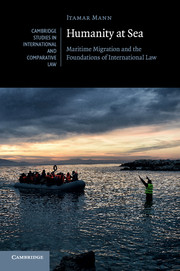Book contents
- Frontmatter
- Dedication
- Epigraph
- Contents
- List of Figures
- Acknowledgments
- Introduction: Humanity Washed Ashore
- 1 Flagless Vessel
- 2 What Is a Human Rights Claim?
- 3 What Is a Human Rights Commitment?
- 4 Between Moral Blackmail and Moral Risk
- 5 The Place Where We Stand
- 6 Imagination and the Human Rights Encounter
- Conclusion: The Dual Foundation of International Law
- Postscript
- Index
- CAMBRIDGE STUDIES IN INTERNATIONAL AND COMPARATIVE LAW
Conclusion: The Dual Foundation of International Law
Published online by Cambridge University Press: 05 September 2016
- Frontmatter
- Dedication
- Epigraph
- Contents
- List of Figures
- Acknowledgments
- Introduction: Humanity Washed Ashore
- 1 Flagless Vessel
- 2 What Is a Human Rights Claim?
- 3 What Is a Human Rights Commitment?
- 4 Between Moral Blackmail and Moral Risk
- 5 The Place Where We Stand
- 6 Imagination and the Human Rights Encounter
- Conclusion: The Dual Foundation of International Law
- Postscript
- Index
- CAMBRIDGE STUDIES IN INTERNATIONAL AND COMPARATIVE LAW
Summary
Physical movement has become a form of political action. Refugees and migrants whose own states have become sources of danger rather than protection, or have otherwise disintegrated, are moving to seek a life worth living. Before they are in the clear jurisdiction of any other state, they meet individuals who must decide how to respond to them. Human rights law is triggered here – by the experience of obligation toward such people. If no state carries out the duty that must be coupled with the right in order to make it enforceable, the duty falls upon individuals in instances of interpersonal encounter. Even if we do not actually experience in our lives such an interpersonal encounter, we need to answer the question: How should agents of our states respond? This question, I have argued, should become the basis for our understanding of human rights beyond the letter of the law.
Though in the late twentieth century international legal theorists sought to overcome sovereignty – or lamented its demise – sovereignty is firmly rooted as one of the bases of international law. It is the basic category by which law recognizes collective political will. But alongside sovereignty, a second non-positive foundation exists. To paraphrase Andrea Bianchi, in contemporary international legal theory this second foundation has retained an “aura of mystery.” Far from being unique to migration or refugee law – or even especially central to this subfield – an appeal to non-positive sources is pervasive across international law. Of course, this appeal is not ordinarily thought of by reference to what I have called the human rights encounter. My experiential account of human rights is a corrective to a more traditional understanding of an unwritten foundation of international law.
In the tradition stemming from the writings of Hugo Grotius, often considered “the father of modern international law,” international law had a dual foundation. On the one hand, there was natural law, also called the law of necessity or jus naturale necessarium. These rules were considered equally binding upon human and divine authority. They were part of a distinctly religious cosmology. On the other hand, there was voluntary law or jus voluntarium, freely authored by political rulers.
- Type
- Chapter
- Information
- Humanity at SeaMaritime Migration and the Foundations of International Law, pp. 211 - 226Publisher: Cambridge University PressPrint publication year: 2016



